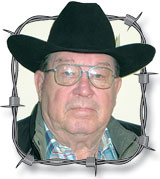Parker's Court History:
Part Three
Let’s round up this Judge Parker business. Besides his leading marshals like Heck Thomas, the black farmer/blacksmith Bass Reeves made a strong record as a tough lawman under Judge Parker, and Reeves became known as the one who brought in many of the worst outlaws.
The one thing that made the deputy marshals disliked the most was they could fine, on the spot, anyone caught with liquor in the Indian Territory. Fines could be as high as $100 per offense.
The deputies also got to pocket this money so they looked hard for booze. Some claimed the marshals even planted illegal moonshine, and then fined them.
It was said if you saw shod horse prints there were marshals in the area. Down in the Younger Bend country, they put a flag in a tall pine tree to warn the wanted that the law was about. The term “bootlegger” came from folks putting pints of liquor concealed in their boots when they rode into the Indian Territory from Kansas.
Parker's worst problems were getting jury members; many deputies had to be on the road all the time serving warrants to come serve. These were citizens of western Arkansas who must stay lengthy terms in Ft. Smith, Ark., when they needed to be home tending their farm, making crops so they could eat. If you didn’t come they arrested you and fined you and you still had to serve. Earning a dollar a day, forced to stay in a bed bug-infested boarding house and eat slop for food, and on top of that, then give their “paper” to some one who ran these flop houses, all while things at home deteriorated, made Parker less than liked on this side of the line.
Sept. 1, 1894 was Parker's last adjournment of the court. All those years Parker walked unarmed back and forth from his house where Channel 5 now exists, to the site on the river. He was never once accosted or shot at despite his iron rule. By the end of his service, his judicial area had shrunk by the addition of other courts and the supreme court could review his cases. He wrote an editorial about them so tough it would fit today’s complaints about the court.
His health went rapidly downhill after the court closed and he died Nov. 17, 1896. A life-long Methodist, he also attended each Sunday at his wife’s church, her being of the Catholic faith, and he was attended by a priest at the end.
Issac Parker has become a controversial symbol of the western frontier and justice. During his years on the bench articles and editorials in eastern newspapers strongly criticized him, but none really knew the extent that the Indian Territory had became a rat’s nest and the sewer for all these criminals escaping the advance of civilization.
To imagine holding court in Fort Smith’s humid summertime without even an electric fan, and keeping the court in session until as late as 9 p.m. – it must have been the real hell. In winter time the fecal smell of unwashed bodies drifting from the jail must have been equally bad.
Those deputies, on their constant guard, crossing the territory in all seasons serving warrants issued by the grand juries…
Folks ask me if I’d liked to have lived back then since my novels are staged in that era. No, firmly, I say, but I would have liked to interview Judge Parker – sat down and talked to men at length like Heck Thomas, Bass Reeves, Jesse James, Cole Younger, Tom Horn, Butch Cassidy, Sundance and a dozen more.
Hope you shot a ten point buck this season and didn’t have a wreck with your scope like a friend of mine. Despite his sore nose and black eye — it’s a real trophy. See you in three weeks.
Western novelist Dusty Richards and his wife Pat live on Beaver Lake in northwest Arkansas. For more information about his books you can email Dusty by visiting www.ozarksfn.com and clicking on 'Contact Us' or call 1-866-532-1960.






